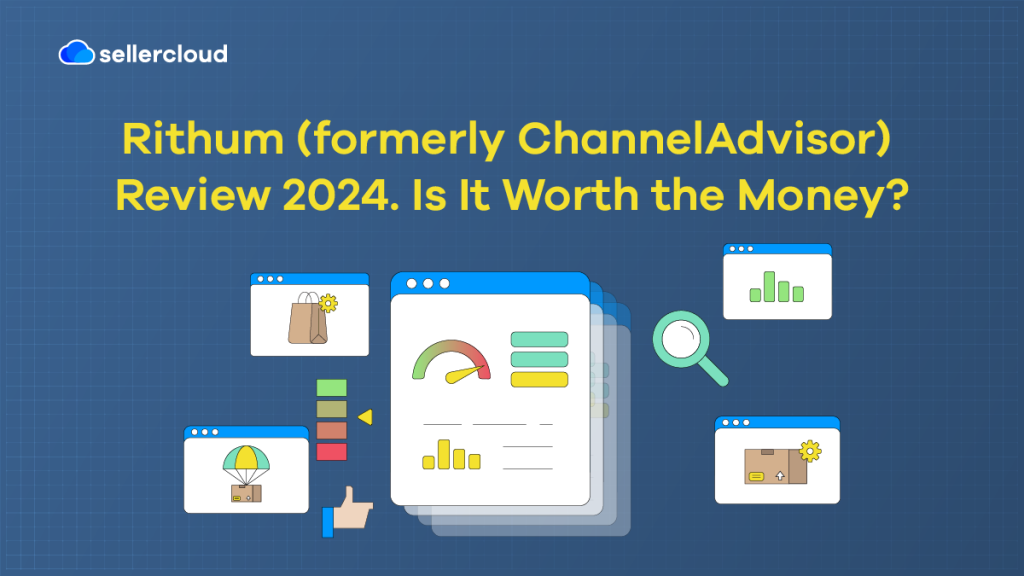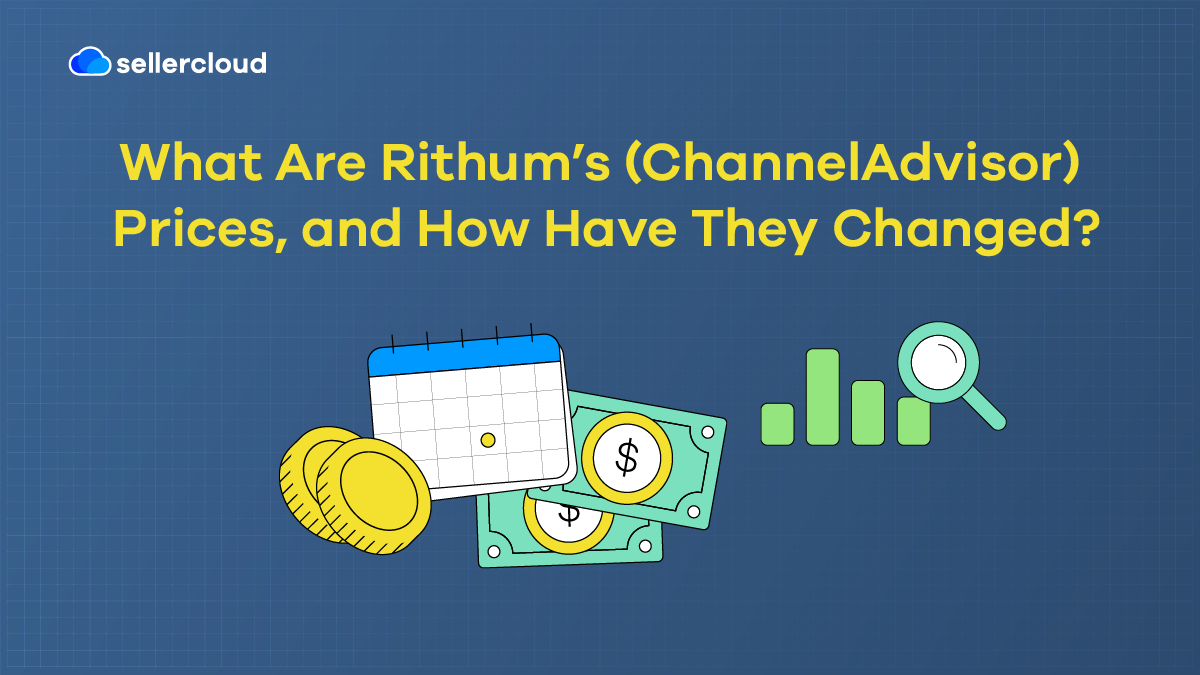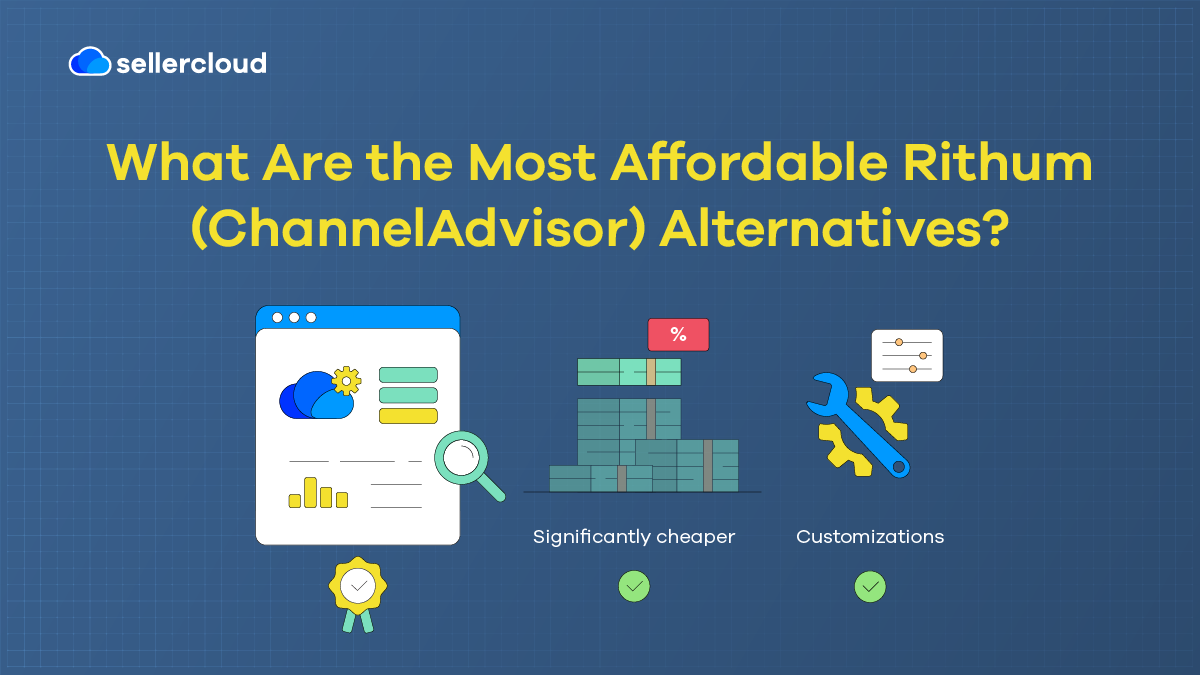
- After being acquired by CommerceHub and rebranding from ‘ChannelAdvisor’ to ‘Rithum,’ some customers say they are now paying four to seven times more.
- Sellercloud is an affordable alternative and offers more features. While Rithum is primarily a listing service, Sellercloud provides the backend services businesses need to grow.
Rithum (ChannelAdvisor) is well-known to many ecommerce sellers. It’s where many sellers start their ecommerce journey.
According to data from 6sense, Rithum—formerly known as ‘ChannelAdvisor’—has approximately 1,266 customers and controls 5.21% of the cloud-based ecommerce solution market.
However, the big question you are likely asking yourself is, “Is Rithum worth the money?” You may have asked yourself that question long before they increased their prices.
This article will explain what Rithum is, how its price change has affected sellers, and the most cost-effective alternatives to Rithum.
What Is Rithum (ChannelAdvisor) and What Does It Do?
Rithum is an ecommerce solution that helps sellers list their products on multiple marketplaces. Rithum started as ‘ChannelAdvisor’ in 2001, making it one of the oldest ecommerce solutions.
According to Crunchbase data, Rithum is headquartered in Atlanta, Georgia, with between 500 and 1,000 employees.
Rithum is great for automating product listings on different channels. It’s one of their strengths, and much of the company’s business has been built on this functionality.
Small businesses often seek out Rithum to increase their visibility on the marketplaces they are integrated with.
However, as they grow, they find that Rithum’s listing capabilities are not enough to build a business, and they need to adopt more robust software that handles vital features such as inventory management.
In fact, Rithum’s most fatal flaw is that it needs inventory data from outside sources to be fed to it.
Rithum doesn’t include any inventory management features, so as their orders grow, businesses using ChannelAdvisor will have difficulty keeping track of their inventory unless they adopt an additional solution.
Who Is Rithum (ChannelAdvisor) For?
Rithum is most suitable for small ecommerce businesses, as it helps them quickly enter the biggest marketplaces and maximize their exposure.
However, Rithum doesn’t appeal to larger, more established businesses because it doesn’t offer the backend features they require.
Larger businesses are not concerned about listing products online as they already have developed their sales channels (hence their size).
Larger ecommerce companies often need features to handle FBA (Fulfillment By Amazon) orders, warehouses, and 3PLs (third-party logistics) providers—things Rithum doesn’t offer.
Why Did ChannelAdvisor Rebrand as Rithum?
Acquiring companies has always been a significant part of Rithum’s strategy. In fact, Rithum is the result of nine acquisitions of ten different companies.
Between 2005 and 2020, under ChannelAdvisor, the company acquired several companies, including BlueBoard, HubLogix, E-Tale, RichFX, Marketworks, and SearchMarketing.
CommerceHub acquired ChannelAdvisor for $660 million in September 2022. Before that, CommerceHub acquired DSCO in 2020 and Mercent Corporation in December 2014.
CommerceHub is an EDI solution. EDI stands for ‘Electronic Data Interchange,’ and it is a method of sending and receiving data between organizations in the supply chain.
Well-known retailers like Lowe’s and The Home Depot work with CommerceHub because they only use EDI connections to receive data from third-party sellers.
Since the rebranding, Rithum has updated its interface, but users have noted that it is very clunky and impractical. Aside from this, their service has only become more costly.
What Are Rithum’s (ChannelAdvisor) Prices, and How Have They Changed?

Since ChannelAdvisor became Rithum, sellers have claimed that the costs of their services have increased as much as four to sevenfold.
Rithum’s pricing has always included a costly revenue share; however, their solution became significantly more expensive when CommerceHub’s EDI fees were added on top.
An EDI transaction occurs every time your business communicates with CommerceHub’s servers, and CommerceHub charges for every EDI transaction it receives.
For example, an EDI transaction happens every time they receive a PO (Purchase Order), then an update on the PO, then acknowledgment of the order, invoicing, and much more.
These fees are small but quickly add up, especially if you have many orders to manage.
Meanwhile, solutions like Sellercloud charge businesses a fixed price per order, not every time they interact with Sellercloud.
Is Rithum’s (ChannelAdvisor) Price Increase Worth It?
Whether Rithum’s price increase is worth it depends on your business needs and budget. That said, it’s critical to remember that the price increase has not added anything new to Rithum’s solution.
So, it is unsurprising that many businesses—big and small—don’t believe the price increase is worth it and are courting alternatives.
Rithum sellers will still need to adopt a separate WMS (Warehouse Management Software) for their warehouse operations and another software to manage business operations.
Furthermore, Rithum is known for its historically bad support, and its reputation has only worsened since ChannelAdvisor merged with CommerceHub.
One two-star review on Trustpilot said, “Ever since they were bought out by Commercehub, service levels have fallen off a cliff. There were months when support cases took days to even receive a response.”
This has also meant that the onboarding process has become more complicated as well, with some sellers complaining that it can now take up to six months. What makes this more frustrating is that Rithum’s onboarding process is already very expensive.
What’s more, Rithum still does not offer customizations for its customers. If you need to create a custom workflow for your business, it will not be possible. With Rithum, you need to adapt your workflow to their solution.
Ultimately, if you are a small business that needs to quickly get its products listed on multiple marketplaces, Rithum may seem like a good option.
Just remember that as you scale, you will need something with more advanced features to support your growing business.
What Are the Most Affordable Rithum (ChannelAdvisor) Alternatives?

It’s not just the costs involved you should consider. You also have to bear in mind the features they include. Here are the top three most affordable alternatives to Rithum.
1. Sellercloud
Sellercloud stands out from the alternatives for two clear reasons: 1) it’s significantly cheaper to use, and 2) it provides the real backend infrastructure that a growing ecommerce business needs.
It can’t be beat on features like inventory management and purchasing, which Rithum does not offer, and a wide range of others.
Countless businesses have switched from ChannelAdvisor to Sellercloud, and many of them cite similar reasons—limited functionality and a lack of flexibility and customization.
Revive IT, a company specializing in refurbished electronics, made the switch years ago. In a testimonial, Co-Founder Chris Ko stated, “as we started to grow a lot of the functionalities of ChannelAdvisor, we’re just limited.”
Elsewhere, in a case study, PST Pool Supplies owner Sal Paldino said, “Very quickly it became very apparent that you don’t get what you pay for. And very quickly, we also realized it wasn’t about the price, but the flexibility and customization offered.”
Paldino also mentioned that since PST Pool Supplies changed from ChannelAdvisor to Sellercloud, “We’re selling twice as much and paying half as less as we were at ChannelAdvisor.”
It’s also worth noting that ChannelAdvisor has been reluctant to work with some businesses because of the nature of the products they sell.
Sellercloud does not discriminate against sellers for the products they sell. Sellercloud only helps you manage your ecommerce operations.
See a side-by-side comparison of Sellercloud and Rithum (ChannelAdvisor) here: Sellercloud vs. Rithum Comparison.
2. Brightpearl
Brightpearl is an alternative for larger businesses. In many ways, Brightpearl is closer to Sellercloud because it offers features that can help you optimize your ecommerce business more.
Brightpearl doesn’t offer listing features, but it is a good option for businesses that need an inventory and order management solution.
However, Brightpearl doesn’t have a WMS, so you will need another solution for these tasks, which will cost more money.
If you need an inventory and order management solution that handles listing well, Sellercloud may be a better option than Brightpearl.
See how Sellercloud compares to Brightpearl here: Sellercloud vs. Brightpearl Comparison.
3. Zentail
Zentail is a good alternative to Rithum for those who need a cheaper ecommerce solution.
Zentail and Rithum are both focused on providing listing features and less so on order management. However, you will get more features for your money with Zentail than with Rithum.
Zentail also integrates with Target Plus, Target’s invite-only program that allows sellers to sell on target.com, a highly sought-after marketplace for ecommerce sellers.
Graduate to Sellercloud—the Most Cost-Effective Solution to Rithum (ChannelAdvisor)
Sellercloud is the most cost-effective alternative to Rithum because it’s cheaper and offers far more relevant features for an expanding ecommerce business.
In terms of pricing, Sellercloud doesn’t require a revenue share from sellers, charge for integrations, or a subscription fee.
Instead, Sellercloud charges per order, and you can find a simple breakdown of how much Sellercloud costs on the pricing page.
Regarding features, Sellercloud offers all-encompassing features that ecommerce businesses need to survive and thrive.
A key example is reporting and analytics features, which sellers cannot get with Rithum. With Sellercloud, you can get expected P&L reports for each order and daily data, which can calculate the costs of doing business, so you always know how profitable your business is.
More importantly, because Rithum doesn’t offer inventory management features, businesses have no idea how much inventory they have, how fast it is depleting, or if fresh inventory is on its way.
With Sellercloud’s inventory management features, you will always have a complete picture of your inventory.
Plus, any features you’re missing with Rithum, you can get through Sellercloud with its many integrations or using custom plugins.
The Sellercloud ecosystem works with a range of products to further improve the efficiency of your ecommerce operations.
- Skustack—Sellercloud’s WMS and barcode scanning app used to pick orders and monitor warehouse activity.
- Skublox—For item and order sorting, it offers pick-to-light and put-to-light functionality.
- 4D Scale—Sellercloud’s 4-dimensional scale for weighing and measuring packages.
- Orderback—A personalized customer portal for managing returns, refunds, and repurchasing.
- Memaila—Enables sellers to manage customer communication across multiple sales channels.
- Clocklocked—Helps sellers manage marketplace ad spend and create targeted ad campaigns.
To learn more about the top alternatives to Rithum (ChannelAdvisor), check out this blog post: Top 5 Alternatives to Rithum (ChannelAdvisor).
Book a demo to learn how transitioning from Rithum (ChannelAdvisor) to Sellercloud can help your business grow.
Key Points
You’re now well-prepared to find a cost-effective alternative to Rithum.
- Rithum is an ecommerce solution that enables sellers to list their catalog on multiple marketplaces.
- Since merging with CommerceHub and changing its name from ‘ChannelAdvisor’ to ‘Rithum,’ prices have increased four to seven times for many sellers without introducing new features.
- Rithum’s support has deteriorated since merging with CommerceHub, as much of their support and development staff were removed.
- The most affordable alternatives to Rithum are Sellercloud, Brightpearl, and Zentail.
- Sellercloud stands out as the most cost-effective alternative to Rithum because it offers backend features that users cannot get and is cheaper to use.




